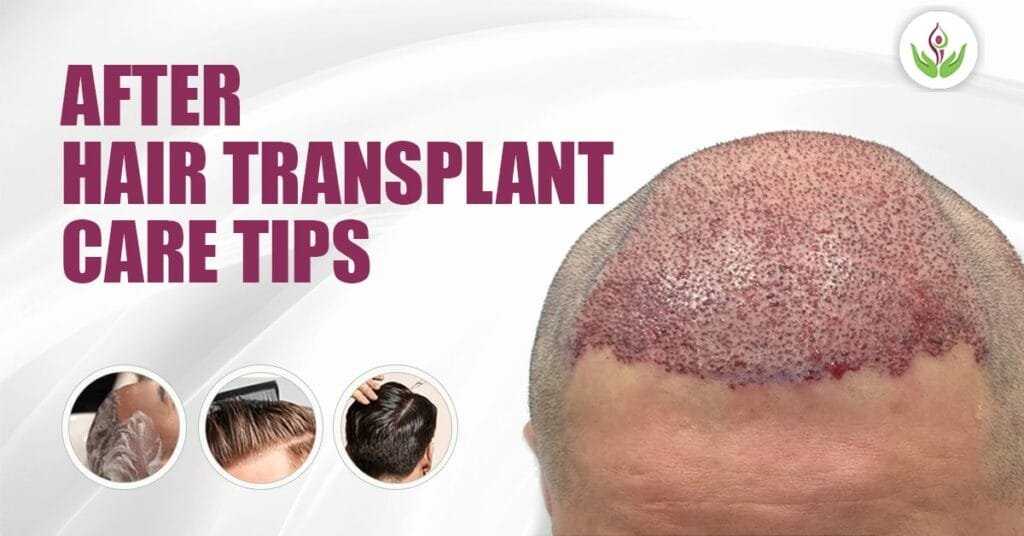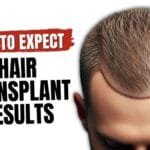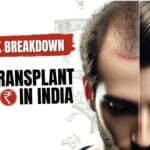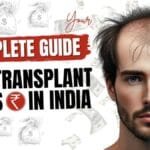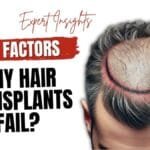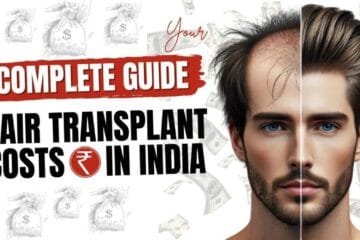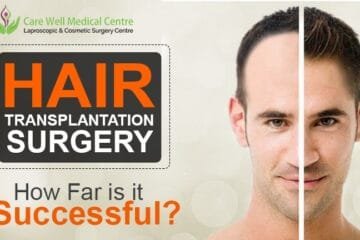Overview
What is the most important thing to take care of after a hair transplant? How should we care for our hair grafts after hair transplantation? Should we take any precautions? In today’s article, we are going to discuss some caring tips for hair transplants. Keeping these things in mind, you can get the best and most guaranteed result from your hair transplant. Let us discuss this further. Hair transplantation is a surgical procedure that involves the removal of hair follicles from one part of the body. The giver site is where the hair follicles are removed, and the beneficiary site is where they are transplanted. The treatment targets male pattern baldness.
The vital standard of hair transplantation is that of contributor authority. The occipital patch has hairs that are resistant to androgen, making it durable. They preserve this asset when transplanted to other patches. Therefore, these hairs have maintained their original form even after transplantation and are unlikely to fall off. Know more about the latest Hair Transplant Cost in Delhi to plan your surgery better.
Maximize Your Hair Transplant Results: Essential Tips for Post-Procedure Care
A hair transplant is a cosmetic surgery that involves moving hair follicles from one area of the scalp to another. People commonly use this procedure to treat hair loss and baldness. After the surgery, it’s important to take proper care of your scalp to ensure that the transplanted hair follicles grow properly. Here are some tips to help you take care of your scalp after a hair transplant:
- Follow your doctor’s instructions
Your doctor will give you scalp care instructions after surgery. It’s important to follow these instructions carefully to ensure that you get the best results. Your doctor may advise you to avoid certain activities, such as swimming or excessive sweating, for a few weeks after the surgery.
- Keep your scalp clean
It’s important to keep your scalp clean after the surgery to prevent infections. Your doctor may prescribe a special shampoo or cleansing solution to use in the first few weeks after the surgery. Make sure to follow the instructions on how to use the shampoo or solution.
- Avoid scratching or rubbing your scalp
After the surgery, your scalp will be sensitive and itchy. It’s important to resist the urge to scratch or rub your scalp, as this can damage the transplanted hair follicles. If you feel the need to scratch, gently tap your scalp with your fingers instead.
- Avoid exposure to the sun
Exposure to the sun can damage your scalp and affect the growth of the transplanted hair follicles. It’s important to avoid direct sunlight for at least a few weeks after the surgery. If you need to go outside, wear a hat or use sunscreen with a high SPF.
- Avoid smoking and drinking
Smoking and drinking can slow down the healing process and affect the growth of the transplanted hair follicles. It’s important to avoid smoking and drinking for at least a few weeks after the surgery.
- Take care when sleeping
It’s important to take care when sleeping after the surgery. Avoid sleeping on your stomach or sides, as this can put pressure on your scalp and damage the transplanted hair follicles. Sleep on your back with your head elevated on a pillow.
Following the right aftercare routine is essential for ensuring the best results after a hair transplant. Following the right aftercare routine is crucial for the success of your hair transplant. For a complete list of dos and don’ts, check out our guide on Precautions & Best Practices After Hair Transplant.
Short-summary
In conclusion, taking proper care of your scalp after a hair transplant is essential to ensure that the transplanted hair follicles grow properly. Follow your doctor’s instructions carefully, keep your scalp clean, avoid scratching or rubbing your scalp, avoid exposure to the sun, avoid smoking and drinking, and take care when sleeping. By following these tips, you can guarantee the best results from your hair transplant surgery.
How long should I rest after a hair transplant?
The curative process starts directly after the technique. Preventing harm or infection in this area is very important in the curative stage. Here we have our comprehensive guide on the recovery timing from an FUE hair transplant. If experts in clinics meet all the important necessities, you will be satisfied with the results of this FUE hair transplant. You will be satisfied with the results.
Following the hair transplant, the individual can resume their daily activities with minimal difficulty. It only takes 8-10 days. It will take a year to return to your final appearance; the duration is not intrusive in any way.
Particularly if the hair you presently planted at the 90 degree angle, the solution will be very perfect. You can carry on with your existence in a very protected and pleased way.
Read Too: Why has FUE considered the best hair transplant?
How long do grafts last after a hair transplant?
There is a great deal of focus on identifying and addressing these factors. That influences the endurance of implants after hair transplantation. The trivial factors that control the transplanted implant embrace the patient’s health. The uniqueness of the hair and the effectiveness of the procedures also play a significant role.
Typically, the curative practice or the time for the transplanted implants to reconcile is around 8-10 days. You need to be very vigilant for the first two weeks after hair transplantation. This is because implants are not fixed immediately after transplantation
- If there are any bandages after 1 to 6 days, you can remove them, but avoid touching the implants.
- Daily, you can wash your hair gently without touching it with your hands using clean water.
- After three weeks, you can clean your hair punctually and return to your daily routine.
- If you have any non-dissolvable stitches after 11 to 15 days, FUT removes them.
- After a few weeks, the transplanted implants will eventually fall out, and new hair will start to grow back.
- After half a year, you can watch that new hair start growing.
- After 14 to 20 months, you can scrutinize the final results.
Can I apply oil after a hair transplant?
Post-hair transplant, one should go through the post-operative instructions given. Doctors typically prescribe shampoo to cleanse the scalp and apply antiseptic lotion or ointment to the affected area. This guarantees the cleaning of the patch and softens the scabs, which promotes the curative method.
One can use coconut or almond oil in the contributor area from 2 weeks onwards. The oil application may also relieve itching or redness in the healing patch. In the beneficiary region, one can start applying oil after 8-12 weeks.
Read Too: How Really Successful is Hair Transplant Surgery?
How can I cover my head after a hair transplant?
Most of the patients are curious to know how soon they can wear a hat after a hair transplant. The scalp may swell after the hair transplant. You may experience some bleeding and coating for the first few days.
Meanwhile, surgeons suggest waiting 8 to 10 days before wearing something over the scalp until the implants are attached. By wearing a hat you could disturb the implants. Damaging the grafts could create empty patches on the scalp and jeopardize the entire hair transplant recovery process. Once the grafts permanently anchor after 7 to 10 days, wearing a hat is considered safe.
How soon can I use Minoxidil after a hair transplant?
Many hair transplant patients wonder if they should use minoxidil after their procedure. It’s usually a beneficial idea for many patients. The use of minoxidil following a hair transplant can do two things:
- The rate at which the transplanted hairs begin to grow after about a month is significant.
- Reduce the risk of additional hair loss in existing hairs (non-transplanted hairs).
What should I eat after a hair transplant?
Try having light food that is digestible just after the surgery. Eat rice, Dal, Chapati, and Rasam.
Protein
Protein, the fundamental component of hair, plays a crucial role in your healing process. Eat plenty of chicken, fish, eggs, milk and cheese, beans, nuts, and seeds to get a variety of essential amino acids.
Fatty Acids Omega-3
Omega-3 fatty acids are required for a variety of bodily functions. But they are frequently deficient in the standard American diet. Fish, including herring, mackerel, and salmon, contain these nutrients. Flaxseed, walnuts, and avocado are examples of vegetarian sources.
Vitamins
Eat a varied diet rich in whole foods to get the full spectrum of vitamins your body requires. Brown rice, broccoli, spinach, whole-grain pasta, black beans, lettuce, peppers, almonds, and zucchini are all excellent choices. A beneficial vitamin can help fill in the gaps.
Foods to Avoid After Hair Transplant Surgery
After a hair transplant, it’s important to take care of your scalp to ensure the transplanted hair follicles grow properly. Avoid the following after hair restoration surgery:
- Alcohol, junk food
- Stressful periods last a long time.
- Stress, like malnutrition, can cause hair loss.
- Maintaining a positive attitude, practicing deep breathing, and getting enough sleep will supplement your dietary efforts.
Along with following your doctor’s instructions, paying attention to your diet is crucial. Here are some foods to avoid:
- Spicy and salty foods: These can irritate the scalp and cause swelling, so it’s best to avoid them for a few weeks after the surgery.
- Alcohol: It can interfere with the healing process and cause dehydration, so it’s best to avoid alcohol for at least a week after the surgery.
- Caffeine: It can constrict blood vessels and affect blood flow to the scalp, so it’s best to avoid caffeine for at least a week after the surgery.
- Carbonated drinks: These can cause discomfort and affect the healing process, so it’s best to avoid them for at least a week after the surgery.
- Foods high in vitamin E: Consuming large amounts of vitamin E-rich foods, such as nuts and seeds, can increase the risk of bleeding and bruising after surgery, so it’s best to avoid them for at least a week after the surgery.
- Fried and greasy foods: These can cause inflammation and lead to acne on the scalp, so it’s best to avoid them for a few weeks after the surgery.
Short-summary
In conclusion, avoiding these foods after a hair transplant can help reduce the risk of complications and speed up the healing process. Remember to consult with your doctor about any dietary restrictions and recommendations specific to your case. By following the tips mentioned above and taking proper care of your scalp, you can maximize the results of your hair transplant surgery.
Which shampoo is best after a hair transplant?
To achieve the best results, use hair-stimulating products after your transplant. Returning to your regular shampoo and conditioner after scabs heal is safe. But it will also not help you maintain your hair growth results.
Hair-stimulating products will not only help you achieve the best possible hair growth from newly transplanted follicles. Additionally, these products aid in preventing hair loss in untreated regions.
Click to uncover the GFC Hair Elixir’s Secrets.
Can I wear a wig after having my hair transplanted?
You can wear a wig after the hair transplant. But be very careful that there is no rubbing against the recipient graft site with the wig. It is very clean, as it might cause bacterial infection in the recipient area. Ask your salon to get it cleaned. Preferably, try to avoid using tapes and glues in your head.
Since FUE requires a shave, most women prefer FUT strip surgery. This is due to the absence of shaving requirements and the lack of visible scarring. Should a woman choose to undergo FUE surgery for any reason, she has options. She can consult with her doctor about wearing a wig or scarf. FUE does not guarantee better results. It is simply a method of harvesting.
Should I massage my head after a hair transplant?
Individuals who have got a hair transplant done should avoid doing head massages for some days.
After 15 days of hair transplant, massage your head in a circular motion at the transplanted area of your hair with the fingertips. The aim is to soften and relax the scalps to promote hair growth.
Massage lightly over your head. The rationale for not massaging your head before 10–15 days is to allow the effects of the surgical approach to settle. You run the risk of damaging your hair follicle if you massage your head before this time.
Can you go bald after a hair transplant?
To have temporary hair loss is normal after a hair transplant. This is a temporary (and somewhat ironic) side effect of hair restoration treatment.
As per the American Academy of Dermatology. It is common for transplanted hairs to fall out two to eight weeks after surgery due to shock. After the third month of the hair transplant, hair usually looks thin. When shock abates, the grafted follicles start producing hair normally. Your transplanted hair grows normally and becomes thicker later on.
The patient will not suffer from pattern baldness after the hair transplant as the follicles will be harvested normally as they have been taken from the back and sides of the head the areas which have good hair growth.
Can I use a helmet after a hair transplant?
When we remove the grafts from the donor area and embed them in the recipient area, they become extremely sensitive and delicate. The donor area might also bleed, and there are chances of crust formation in that area. It becomes very critical to take care of these grafts post-hair transplant.
If you don’t take precautions, there are chances that a hair transplant might fail. If you wear a cap, it is a good option, but avoid wearing a helmet within a few days after a hair transplant. Wearing a cap or helmet might cause friction against the grafts, so try to avoid wearing a helmet or cap till recovery.
The period to avoid wearing a cap is 10-15 days, while you should not wear a helmet till 2-3 weeks after a hair transplant. Preferably, wear a loose cap or helmet, as a tight cap or helmet might cause the hair follicles to stick to the cap or helmet. This might cause unnecessary harm and scalp infection. Try to cover your head with a bandanna or cloth, then wear a cap or helmet.
Is PRP necessary after a hair transplant?
It might be strange, but it is true that PRP (Platelet Rich Plasma) makes the grafted hair stronger and thicker. PRP helps new follicles to survive and grow in better conditions. Research has proven that PRP injections can prevent hair loss. It has also helped the entire hair scalp without transplantation.
What is PRP?
Plasma-rich platelet is an injection that contains platelet concentrations several times higher than usual in the blood. The patient’s body is the source of the autologous blood.
Benefits of PRP
- Strengthening the poor donors as well as the areas that are not transplanted.
- It increases the graft yield rate.
- Reduce the transactional graft rate.
- Heals the donor as well as recipient areas.
- It increases the viability of hair follicles.
- Helps in repairing tissues and the healing process.
- We strengthen hair follicles and stimulate hair growth.
What should one avoid after receiving a hair transplant?
Before hair transplantation, it is essential to go through proper pre-hair transplantation care. This will ensure a smooth transplantation process and prevent any discomfort during the process. The person going through the procedure should follow the given hair transplant care:
- Don’t consume Aspirin, Advil, anti-inflammatory medicines, or painkillers. This also applies to vitamins, particularly Vitamin B and E, blood thinners, and any herbal medications.
- The person should also stop taking any sort of steroids and using cortisone creams, as they can raise the threat of bleeding during the surgery.
- You cannot consume alcohol or smoke during this procedure.
How can you avoid hair loss after a hair transplant?
Here are some ways to ensure you receive long lasting results from a hair transplant.
Proper Timing of the Surgery
Patients may experience hair thinning after a transplant if the surgery is performed too soon. It is possible to harvest hair from a part of the scalp that was about to fall out. Before surgery, patients must have a take on how far their hairline would recede and the overall extent of balding.
Picking the Right Hair Transplant Surgeon
Regarding the previous point, baldness after a hair transplant could result from an inexperienced or poorly trained surgeon. A reputable surgeon may take your age, medical history, and other factors into account. When determining the best time for surgery and the best technique for your needs, a reputable surgeon will take these factors into account.
Do your research and consider a few promising surgeons in the Delhi, INDIA, area. When making your final decision, choose a surgeon who is well-trained and whose judgment you can rely on.
Follow Aftercare Instructions
Following your hair transplant, you’ll want to do everything possible to care for the transplanted follicles and your scalp. Follow all post-op instructions to the letter, and report any concerns to us as soon as they arise.
Conclusion
A hair transplant operation could be a more viable option for individuals experiencing hair loss and thinning hair. It may not be an everlasting resolution to thinning hair. But for many people, it can assist in reinstating hair richness and self-assurance. Visit or call Care Well Medical Centre to undergo a hair transplant under the expert guidance of surgeons.

